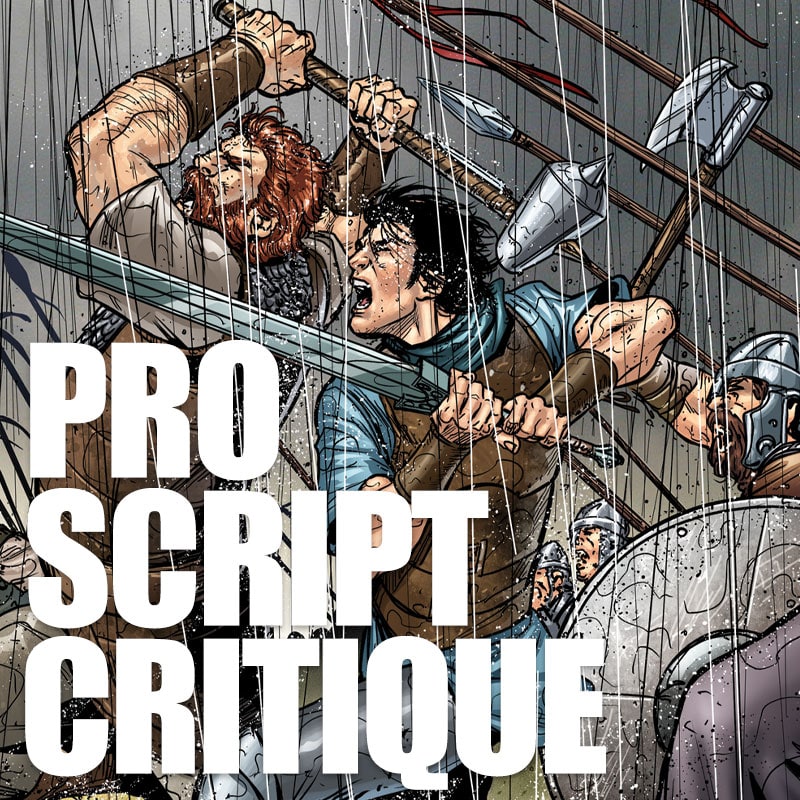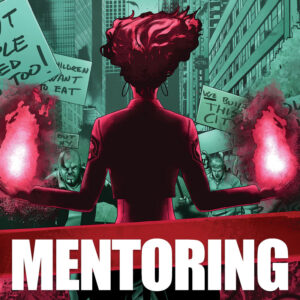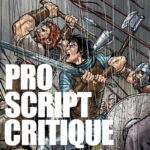
Pro Script Critique
$50.00 – $300.00Price range: $50.00 through $300.00
You’ve done your homework and you’ve written a great script. But how can you be sure it’s really good? You can send it to us and our seasoned veteran writers or editors can give it a professional review.
The notes you get back will let you know what’s working, what’s not quite there yet and advice on where to make adjustments. Our critiques aim to be friendly and encouraging, but also honest. You need real feedback in order to improve.
You can submit your script for review right here on the web, and you’ll get feedback from either a professional writer or editor.
The Comics Experience staff aim to be both honest and professional. Your critique will most likely contain both criticism and some praise. We believe in treating each creative person (all people, really) with respect and that extends to their work. We aim to let you know what is working in your script, what does not appear to be working for the critiquer, and offer up either a possible solution or some advice on how to approach the perceived issue. We do not intend to be harsh nor do we couch criticism in overtly personal ways. We hope that our critiques, while being honest and indeed critical, are also constructive for you and your work. With that in mind, please adhere to the following guidelines:
- Critiques are for people looking for honest and critical feedback
- Critiques will come from someone in the Pro Critique pool but will be anonymous
- Clients should have their script in a format that follows the Comics Experience Script Template or is a similarly industry accepted format. Unusually formatted scripts are harder to critique, and may result in delays on the critique or, in some cases, rejection of the script for critique.
- The script must be submitted as a Microsoft Word document or a PDF.
- Naming Your File: use the name of your story, your name and state the page length (e.g. World’s Greatest Comic by Jane Doe – 20 pgs).
- Pages must average 225 words or LESS per comic book page. If word count exceeds limits, additional charges may be required or script returned for edits.
- The Word Count above should NOT be your target word count. Most professionally written scripts are under 175 words per page on average.
- Script revisions that are submitted after an initial critique are treated as new critique requests.
How to Submit
To submit your script for a pro critique, do the following:
- Select the number of comic book pages in your script (this may be different than your document’s page count – see the “Guidelines/Rules” tab for specific details).
- Click “Add to Cart.”
- Proceed to checkout. Fill out all the billing information.
- Click “Place Order.”
- After purchase, you will be asked to fill out a form which will request:
- The name of the script writer.
- The email address you would like your critique sent to.
- Microsoft Word or PDF document that follows the format explained in the Guidelines/Rules tab.
Script Tips
Story notes – Provide relevant context to your story – include genre, themes, structure (mini-series, one-shot, etc) and/or state areas that you are most concerned about or want specific comments on.
Recap – When submitting a script that is not the first issue in a series, include a synopsis of what came before, and a character guide. The synopsis/recap can be simply a short paragraph.
Character guide – A character guide should be nothing more than a line of text or a few words describing each of the most significant characters. Full character descriptions should be given when reading the script upon a character’s entrance.
These tips help the pro critic gain a better understanding of your story, allowing them to provide the best critique possible.
Reviewers

Andy Schmidt
Andy founded Comics Experience based on the guiding principle of developing the kind of useful tools he himself wished existed when he was trying to break into the comics industry. This vision led to the creation of the mentorship program. Andy has helped develop the careers of several working professionals as well as worked with long established pros who seek advice and problem-solving outside of the typical channels. Andy is an ideal mentor for anyone looking to achieve his or her comic book career dreams. Writers, artists, and editors welcome!

Molly Lazer
From 2004 until 2008, Molly Lazer was an assistant and then associate editor at Marvel Comics, where she assisted on comic books such as Fantastic Four, Captain America, and New Avengers and was the editor of cult favorite comic books Spider-Girl and Thunderbolts. These days, after receiving a M.S.Ed. in Reading, Writing, and Literacy, she can be found teaching high school, acting, and directing plays outside of Philadelphia or hanging out at Rosemont College, where she is a MFA candidate in Creative Writing. Her fiction and poetry have appeared in various literary magazines including Gingerbread House, Rose Red Review, Mirror Dance, Scapegoat Review, Medical Literary Messenger, and scissors & spackle.

Marc Sumerak
Eisner and Harvey Award nominated writer Marc Sumerak has spent the last two decades creating books, comics, and video games showcasing a number of today’s most popular entertainment brands, including Marvel Comics, Star Wars, Harry Potter, Ghostbusters, Back to the Future, Firefly, and more.

Paul Allor
Paul Allor is a critically-acclaimed writer, editor and letterer who began as a Comics Experience student and workshop member, eight years ago. Since then, they have written for Marvel Comics, AfterShock Comics, IDW Publishing, BOOM! Studios, Dynamite Entertainment, Vault Comics and others.

Fred Van Lente
Fred Van Lente is a six-time New York Times bestselling comics writer, novelist and playwright whose work spans mystery/thrillers to historical fiction to superheroes to comedy.

Nicole Boose
Nicole Boose began her comics career as an assistant editor for Harris Comics’ Vampirella, before joining the editorial staff at Marvel Comics. There, she edited titles including Cable & Deadpool, Invincible Iron Man, and Stephen King’s Dark Tower adaptations. She also oversaw Marvel’s line of custom comic publications, developing projects for corporate and nonprofit clients like Target, OfficeMax, SAMHSA, and TeachersCount.
Advice on Receiving Critiques
Quote from prose writer Hanna Martine about her first experience getting critiques and advice for getting the most out of critiques:
I had no idea what to do with the comments. There were many. They were critical. I may have cried; I don’t remember.
What I do remember was taking a moment to detach myself from my manuscript (that hurt; it was like really strong Velcro being pulled apart) and saying to myself, “These people are trying to help you. This is what you wanted, to improve your writing. Right?”…
What took me a few months to realize was that all of those writers I envied/admired/feared/loved started somewhere. They once had their own doubts and anxieties. They all had their own “where I began” stories”…
They were not “better” than me. They had just started before me.
Learning how to absorb criticism and apply it to my writing was by far the most important lesson I’ve learned. It works with critique partners. It works with editors…I remind myself of these points every time I send work out to be beta read:
- Acknowledge you have weaknesses. Don’t defend your work. Listen.
- Be open to suggestions you may not have considered, even if it changes your original story plan.
- Don’t ask for critique if you’re just looking for compliments. You will never, ever, ever please everyone. And as my good friend says: “If you just want someone to tell you it’s awesome, send it to your mother.”
- Find critique partners you respect who understand what you’re trying to write and offer suggestions accordingly.
Critique questions:
If you’ve received a critique and aren’t clear about what the critiquer meant, it’s fine to request clarification. We do not give refunds on critiques.
Related products
-

Mentoring
Select options This product has multiple variants. The options may be chosen on the product page
